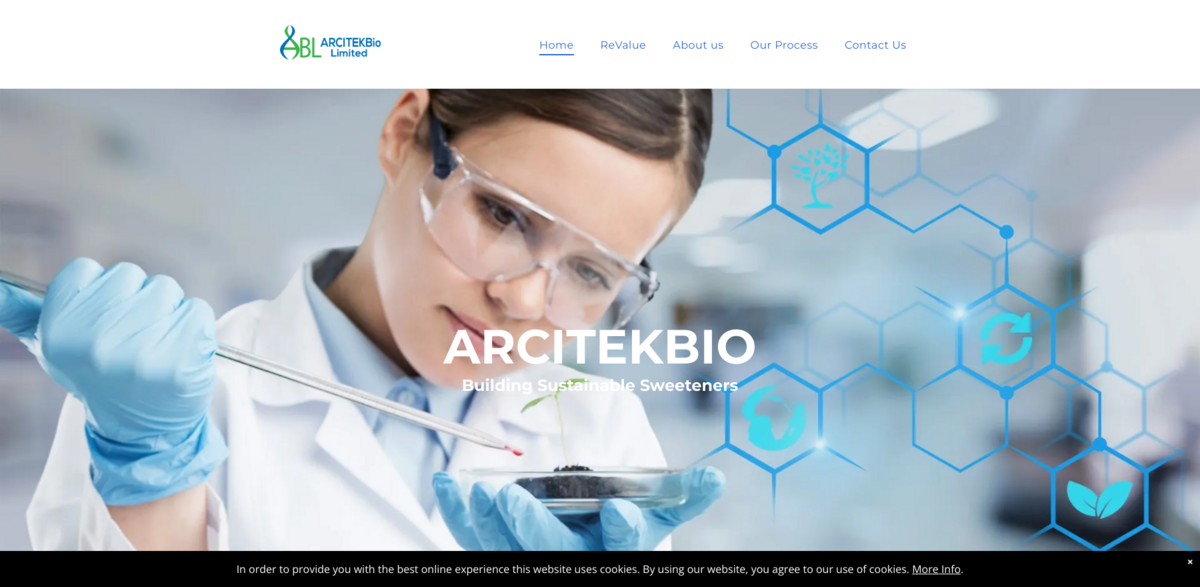What the Project Is
Xylitol is a natural sweetener that can serve as a healthier, renewable alternative to sugar in products like chewing gum and confectionery, where it helps protect children’s teeth. ARCITEKBio, a spinout from Aberystwyth University founded on principles of sustainable growth, innovation with impact, and value creation, has refined an EcoXyl process that converts agricultural wastes such as wheat straw and wood pulp into 100% renewable xylitol. This robust yeast-based biomanufacturing solution, developed over four years with over £1M invested in research, provides a disruptive alternative to the conventional chemical processes that are costly, inefficient, and often involve toxic conditions while achieving less than 40% sugar capture. The resulting breakthrough platform can efficiently transform waste feedstocks like wood and straw into a high-quality, natural sweetener that is ready to disrupt the global sweeteners market. It’s a modern marvel tailored for an evolving landscape that balances environmental sustainability with cutting-edge biotechnology.
Main Benefit
- Estimated global market potential of approximately $1.4bn for xylitol.
- Fully renewable and sustainable production from agricultural waste streams.
- Process is feedstock independent with no need for pre-clean up or detoxification.
- Developed using a robust yeast-based biomanufacturing platform.
- Backed by successful Innovate UK funding and moving into a private equity seed round.
Investors and Funding
Investors in cleantech and biotechnology have quickly taken notice of ARCITEKBio’s pioneering efforts. The company’s bio-manufacturing platform utilizes waste or processed streams of C5 sugars and converts them into the world’s leading sugar substitute. This smart integration of synthetic biology and chemical engineering has sparked significant interest, especially among those keen to promote sustainable low carbon footprint technologies. The initial success in securing Innovate UK funding in 2019 served as a robust stepping stone, reassuring future stakeholders about the platform’s potential to redefine the global sweeteners market. With a private equity seed round on the horizon, ARCITEKBio is inviting interested parties in cleantech, sustainable manufacturing, and agri-biotechnologies to engage in dialogues that could shape the future of renewable sweeteners.
Waste Stream Producers Opportunities
Producers of waste streams, such as paper and pulp manufacturers, brewers, distillers, and agricultural waste generators, now face a promising opportunity. Traditionally, these waste streams have either carried disposal costs or fetched only modest revenues when sold as low value by-products. ARCITEKBio offers a high-value chemical alternative, turning what was once an expensive waste management problem into a revenue-generating venture. By maximizing revenues and reducing environmental impact, this innovative process establishes a win-win collaboration for waste stream producers. The dialogue with potential partners is actively sought to foster joint ventures that not only boost economic returns but also contribute to a cleaner, more sustainable environment.
Xylitol Manufacturers and End-Users
Xylitol manufacturers confronted with supply chain complexities, legislative pressures, and environmental challenges are finding new hope in the innovative biomanufacturing process of ARCITEKBio. The traditional chemical-based production methods present a host of issues, from inefficiencies to harsh operating conditions. This breakthrough biotechnology does away with many of these challenges by eliminating the need for costly pre-clean up or detoxification processes, all while ensuring competitive yields, purity, and techno-economics. End-users of xylitol, including food, bakery, and pharmaceutical industries, also stand to benefit from a product that possesses a clean, almost neutral after-taste. Not only does this reinvigorate interest in xylitol’s application spectrum, but it also paves the way for a step-change in how renewable sweeteners are produced and perceived across the market.
Creating Sweeteners from Agricultural Waste
The concept of turning agricultural waste into a valuable product might sound like a leap of innovation—and it truly is. By leveraging a sophisticated biomanufacturing process, agricultural wastes like wheat straw and wood pulp are transformed into high-grade xylitol. This emerging biotechnology challenges the status quo of heritage chemical processes, which are known for their inefficiencies and reliance on toxic conditions. Instead, the process embodies a modern, sustainable ethos, full of promise for both economic and environmental impact. It is a prime example of how rethinking waste can yield products of immense value in a market that is rapidly expanding and evolving.
Project Impact on Sustainable Development
- SDG 7: Affordable and Clean Energy – By utilizing renewable feedstocks.
- SDG 9: Industry, Innovation and Infrastructure – Through innovative biomanufacturing processes.
- SDG 12: Responsible Consumption and Production – By converting waste into high-value products.
- SDG 13: Climate Action – Through the reduction of toxic chemical processes and lowering carbon footprints.
Future Directions and Market Potential
The industry is abuzz with excitement about the future of xylitol production using ARCITEKBio’s EcoXyl process. As manufacturers and end-users continue to seek healthier, more sustainable alternatives, this technology is poised to be at the forefront of the market revolution. The breakthrough is seen not merely as an incremental improvement but as a radical shift away from outdated methods. With its capacity to create renewable sweeteners that are clean, efficient, and economically advantageous, the platform sparks a vision of a future where agricultural waste is not discarded but transformed into a key ingredient for healthier consumer products. This dynamic, conversational shift in approach could very well redefine norms in both the food and pharmaceutical industries, offering a blueprint that other sectors may eventually emulate… A bright future awaits as this technology continues to develop and scale in response to increasing global demand for sustainable, renewable sweeteners.


















